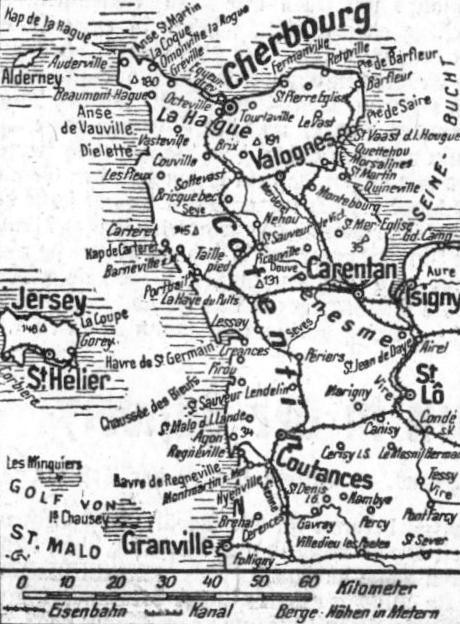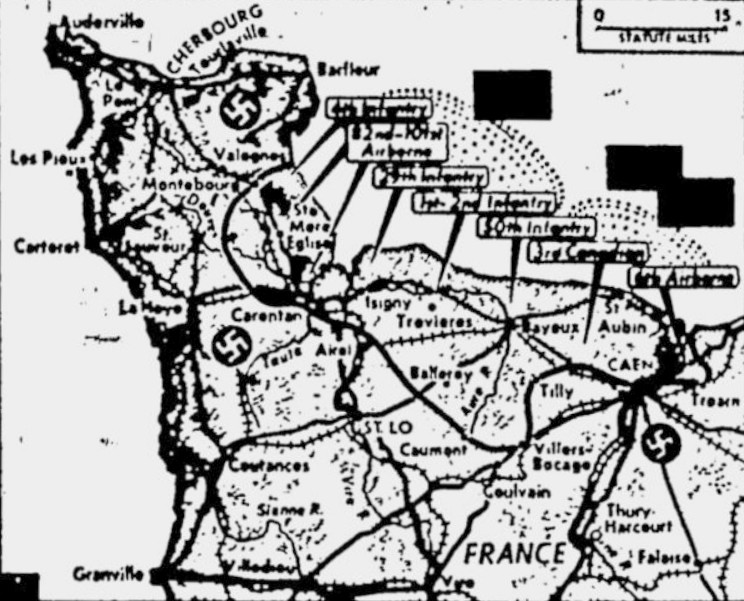Mosley: Paratroopers spring trap on 600 German grenadiers
By Leonard Mosley
With British 6th Airborne Division, France (AP) – (June 12, delayed)
Paratroop Capt. Charles Bliss had that grin on his face that always means something brewing.
Charles said:
This is going to be good. Do you remember the gap we left in our lines just around Bréville? Well, Jerry’s found it at last and he’s coming through. We have a report of at least 600 panzer grenadiers advancing through the woods and believe they’re going to try to drive through Ranville to break our line and gain the east bank of the river. well, what we are going to do to those Jerries should make a nice little story for you. Look.
He pointed along the walls and through the orchards and when you looked hard, you could see British troops everywhere.
They were well dug in among bushes and grass, and only the green camouflaged tops of their helmets poked around the skyline – that and the muzzles of their Brens, heavy machine guns and Stens.
See for approach
It was just before noon that we saw out first Germans. Over on the other side of the dropping zone, you could suddenly see figures moving among trees. We watched them forming up into batches of 10-15 men.
No one fired at them. Only the dull boom of artillery from somewhere away in the distance, and the busy hum of fighting planes disturbed the placid Saturday morning.
Shortly after noon, the German attack began. In those batches of 10 and 15, spread out over 200 or 300 yards, the German infantrymen came in at a run. They moved through the waving corn in the black ploughland until they reached a line of wrecked gliders. Then, they fell on their faces and lay there. After a few minutes they got up again, ran forward, then fell flat again. It went on like that for about 400 yards. Still, no one fired.
Mortar gun fires
From somewhere in the wood now a German mortar gun was going into action and its shells fell all around us and in the serried rows of gravestones in a churchyard. Splinters fell among us. There were casualties. But there was no retaliation.
Stretcher-bearers wriggled forward and dragged wounded men away, but never showed themselves against the skyline.
Now the enemy was gaining confidence from the stillness. Smelling no danger, his loping advances were longer, his periods flat on the ground of only a few seconds duration. He came on fast. He kept on coming until he was about 100 yards away. Then at a prearranged signal every automatic weapon, every rifle in the paratroops’ line opened up. It was a roar that set your teeth chattering with shock.
You suddenly saw the Germans grimacing wildly, clutching their bodies, throwing up their hands, then falling by the dozens into the corn. They all flung themselves down and the British paratroops continued their fire.
Rain of bullets
A rain of bullets surged across those 100 yards of French farmland and battered into the huddles on the grass. The earth was scuffed up in showers of corn and went down as if under a flail.
But the Germans weren’t beaten yet. One of their officers rose to his feet and called to his men, and those not wounded charged once more. This time, the paratroops held their fire even longer, and it was 23-30 yards when the small-arms barrage hit the enemy.
Fingers squeezed triggers almost simultaneously up and down the line. In writhing heaps, the Germans went down again. And now the remnants turned and began to flee.
Bullets chased them across the field as they raced for woods. But only a few made that shelter, for now our shells and mortars came into play and plastered a river of steel between the enemy and the sanctuary for which he was racing.
Hundreds killed
By 10 o’clock, it was all over, and the dropping zone was littered now not only with gliders and containers, but with hundreds of enemy dead and enemy wounded.
On Sunday morning, the Germans tried again to blast through to Ranville.
Once more they came in batches, and once more the British mowed them down with the same grim efficiency. That same morning, they had enough and went limping away to the safety of the marshes beyond the Orne.
With the men who had killed them – boys from Lancashire, Yorkshire, Somerset – I went into the woods to see the flotsam and jetsam this short but bloody war had left. Everywhere was death. But it was Nazi death. At least 400 had been killed and nearly 2,000 made prisoners. And in breaking the whole of a German regiment and capturing its commander, British losses did not number over 50 all told, including wounded.

